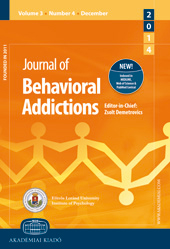Online and Live Regular Poker Players: Do They Differ in Impulsive Sensation Seeking and Gambling Practice
Online and Live Regular Poker Players: Do They Differ in Impulsive Sensation Seeking and Gambling Practice
Author(s): Servane Barrault, Isabelle VaresconSubject(s): Cognitive Psychology, Comparative Psychology, Psychoanalysis, Substance abuse and addiction, Social Informatics
Published by: Akadémiai Kiadó
Keywords: poker; impulsive sensation seeking; online gambling; sociodemographic; problem gambling;
Summary/Abstract: Online gambling appears to have special features, such as anonymity, speed of play and permanent availability, which may contribute to the facilitation and increase in gambling practice, potentially leading to problem gambling. The aims of this study were to assess sociodemographic characteristics, gambling practice and impulsive sensation seeking among a population of regular poker players with different levels of gambling intensity and to compare online and live players. Methods: 245 regular poker players (180 online players and 65 live players) completed online self-report scales assessing sociodemographic data, pathological gambling (SOGS), gambling practice (poker questionnaire) and impulsive sensation seeking (ImpSS). We used SOGS scores to rank players according to the intensity of their gambling practice (non-pathological gamblers, problem gamblers and pathological gamblers). Results: All poker players displayed a particular sociodemographic profile: they were more likely to be young men, executives or students, mostly single and working full-time. Online players played significantly more often whereas live players reported significantly longer gambling sessions. Sensation seeking was high across all groups, whereas impulsivity significantly distinguished players according to the intensity of gambling. Discussion: Our results show the specific profile of poker players. Both impulsivity and sensation seeking seem to be involved in pathological gambling, but playing different roles. Sensation seeking may determine interest in poker whereas impulsivity may be involved in pathological gambling development and maintenance. Conclusions: This study opens up new research perspectives and insights into preventive and treatment actions for pathological poker players.
Journal: Journal of Behavioral Addictions
- Issue Year: 5/2016
- Issue No: 1
- Page Range: 41-50
- Page Count: 10
- Language: English

